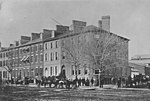Independent Women's Forum
The Independent Women's Forum (IWF) is a conservative American non-profit organization focused on economic policy issues of concern to women. IWF was founded by activist Rosalie Silberman to promote a "conservative alternative to feminist tenets" following the controversial Supreme Court nomination of Clarence Thomas in 1992. IWF's sister organization is the Independent Women's Voice (IWV), a 501(c)(4) organization. The group advocates "equity feminism," a term first used by IWF author Christina Hoff Sommers to distinguish "traditional, classically liberal, humanistic feminism" from "gender feminism", which she claims opposes gender roles as well as patriarchy. According to Sommers, the gender feminist view is "the prevailing ideology among contemporary feminist philosophers and leaders" and "thrives on the myth that American women are the oppressed 'second sex.'" Sommers' equity feminism has been described as anti-feminist by critics.
Excerpt from the Wikipedia article Independent Women's Forum (License: CC BY-SA 3.0, Authors).Independent Women's Forum
I Street Northwest, Washington
Geographical coordinates (GPS) Address Nearby Places Show on map
Geographical coordinates (GPS)
| Latitude | Longitude |
|---|---|
| N 38.9018 ° | E -77.0428 ° |
Address
Nirvana Express
I Street Northwest
20006 Washington
District of Columbia, United States
Open on Google Maps







